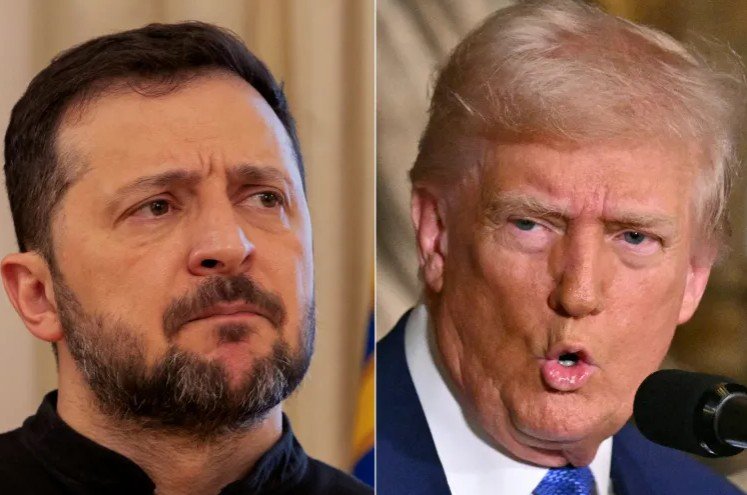…a high-level meeting between American and Russian officials took place in Saudi Arabia earlier this week, culminating in an agreement to begin preliminary negotiations
United States President Donald Trump has intensified his attacks on Ukrainian President Volodymyr Zelenskyy, marking a stark departure from previous US policy. This shift comes as the Trump administration moves toward a new approach to the ongoing Russia-Ukraine war, aligning itself with diplomatic engagements that have raised concerns among Ukraine and its European allies.
Escalating Criticism of Zelenskyy
Trump’s recent statements have fueled tensions, as he continues to blame Zelenskyy for Ukraine’s war-time struggles. In a Fox News interview, when confronted with the assertion that Russia’s invasion was “Putin’s fault,” Trump dismissed the notion, suggesting that Zelenskyy had failed in negotiations. He criticized the Ukrainian president for “negotiating with no cards” and downplayed his role in diplomatic talks, remarking that Ukraine had “got nothing” from previous engagements.
Trump’s rhetoric did not stop there. He later reiterated his stance during a meeting with US governors, further alienating Zelenskyy by labeling him a “dictator without elections” in a social media tirade, despite the fact that Ukraine remains under martial law due to the war.
A Shift in US Policy on Ukraine
Trump’s unrelenting criticism of Zelenskyy aligns with a broader shift in US policy under his administration. Unlike former President Joe Biden, who committed to unwavering transatlantic support for Ukraine, the Trump administration has signaled a willingness to pressure Kyiv into making concessions to Russia.
US Defense Chief Pete Hegseth recently told NATO allies that Ukraine must accept it will not regain territories lost to Russia since 2014 and that NATO membership is off the table for Kyiv. This position, seen as a significant departure from previous commitments, suggests that Washington is now prioritizing an end to the war over Ukraine’s territorial integrity.
Further signaling a new US approach, a high-level meeting between American and Russian officials took place in Saudi Arabia earlier this week, culminating in an agreement to begin preliminary negotiations. Hours later, Trump controversially claimed that Ukraine “should have never started” the war, prompting Zelenskyy to accuse the US president of spreading disinformation.
Rare Earth Minerals and US-Ukraine Relations
Another crucial factor in this evolving dynamic is a reported deal between Washington and Kyiv concerning Ukraine’s vast reserves of rare earth minerals. White House National Security Adviser Mike Waltz stated that Ukraine is close to signing an agreement allowing US access to these minerals in exchange for continued support in the war.
This deal, which the Trump administration has actively pushed, was initially rejected by Zelenskyy when US Treasury Secretary Scott Bessent sought a 50% ownership stake in Ukraine’s mineral resources. However, recent pressure from Washington appears to be yielding results, with Waltz insisting that Zelenskyy would soon finalize the agreement. The move suggests that US backing for Ukraine is now increasingly tied to strategic economic interests rather than ideological support for Kyiv’s war effort.
International Reaction: Allies Condemn Trump’s Stance
Trump’s escalating criticism of Zelenskyy and the US policy shift have drawn strong reactions from European leaders. German Chancellor Olaf Scholz reaffirmed Europe’s commitment to Ukraine, stating, “We won’t leave Ukraine alone and decide things over their heads.” French President Emmanuel Macron has also vowed to confront Trump on the issue, warning that the US must not “be weak” in dealing with Russian President Vladimir Putin.
British and French leaders are set to visit Washington next week to address concerns over the US position, while Poland’s President Andrzej Duda has urged Zelenskyy to maintain “calm and constructive cooperation” with Trump.
Uncertain Future for US-Ukraine Relations
Despite the diplomatic fallout, some US officials have attempted to temper Trump’s remarks. US Special Envoy to Ukraine Keith Kellogg described Zelenskyy as “the embattled and courageous leader of a nation at war” after a meeting in Kyiv, though a planned joint press conference was reportedly canceled at the request of the US.
As Trump continues his public criticism of Zelenskyy, the future of US-Ukraine relations remains uncertain. The administration’s apparent willingness to offer Russia concessions, alongside its pressure on Kyiv to grant US access to its mineral wealth, signals a fundamental shift in America’s approach to the conflict. Whether this new strategy will lead to a breakthrough in peace talks or further instability in Ukraine remains to be seen.


